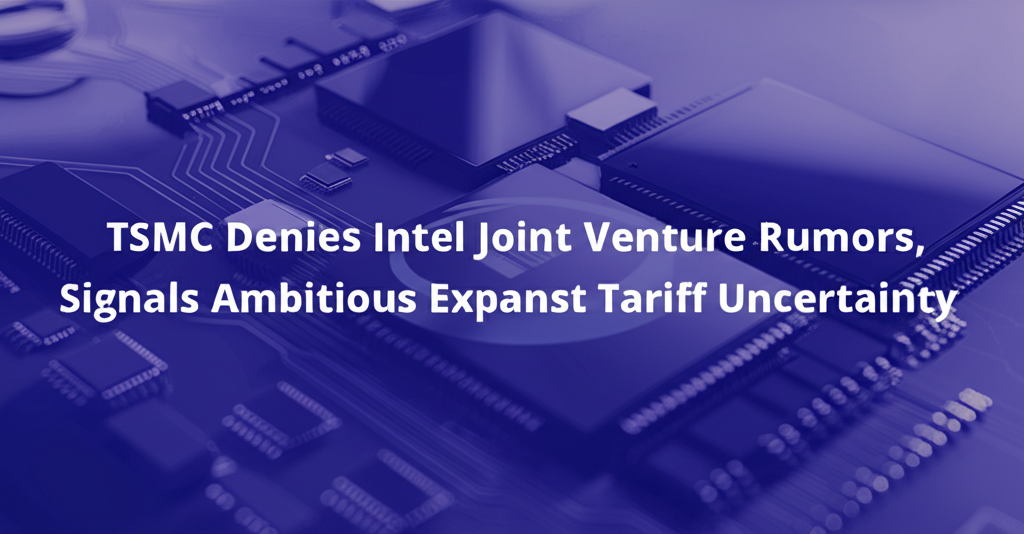TSMC Denies Intel Joint Venture Rumors, Signals Ambitious Expansion
Taiwan's Semiconductor Giant Charts a Course of Global Growth Amidst Tariff Uncertainty.

Taipei, Taiwan – Taiwan Semiconductor Manufacturing Co. (TSMC) Chairman C.C. Wei (魏哲家) addressed market speculation this week, firmly denying reports of a joint venture with U.S.-based chipmaker Intel Corp.
Speaking at an investor conference, Wei dismissed rumors of a partnership aimed at operating Intel's wafer foundry business. He confirmed that TSMC is not in discussions for any joint venture deal, and that no technology transfers or licensing talks have occurred. These statements come amidst reports that the U.S. government was pressuring TSMC to take a stake in a new company to rescue Intel's wafer foundry operations, and that the deal raised concerns about potential business secret leaks from TSMC.
The announcement comes at a time of significant investment in the United States. Following a previous meeting with U.S. President Donald Trump, TSMC committed to an additional US$100 billion investment in Arizona, increasing the total investment to US$165 billion. This expansion includes plans for three advanced wafer fabs, two IC assembly facilities, and a research and development center.
The rationale behind the substantial U.S. investments, according to market observers, is to comply with threats of tariffs, prompting foreign manufacturers to invest in the U.S. market. Wei reiterated that these investments are designed to meet the needs of TSMC's American clients, including Apple, Nvidia, Qualcomm, and Broadcom.
Wei stated that the U.S. facilities are expected to account for approximately 30 percent of the total production of the 2 nanometer process, forming an independent semiconductor cluster. The 2nm process is under development, with mass production slated to begin in Taiwan in the second half of this year.
The context of this announcement includes the backdrop of U.S. tariff policies. Taiwan, along with other countries, has faced tariffs from Washington. While a 90-day pause on the new measures has been announced, the situation underscores the complexities of the global trade landscape.
Regarding TSMC's strategy amidst these uncertainties, Wei emphasized the company's determination to strengthen its fundamentals, maintain its global market lead, upgrade technologies, and bolster client trust. He expressed confidence in TSMC's continued outperformance in the pure play wafer foundry business.
TSMC has maintained its guidance for 2025, despite the challenges, with sales expected to grow by 24-26 percent in U.S. dollar terms, exceeding the 10 percent increase projected for the entire pure play wafer foundry sector.
Capital expenditure for 2025 is planned at US$38.0 billion to US$42.0 billion, driven by strong client demand. 70 percent of this will be allocated to advanced process development, with the remainder going to specialty technology development, advanced IC assembly and testing, and photomasking development.
Chief Financial Officer Wendell Huang (黃仁昭) forecasts consolidated sales of US$28.4 billion to US$29.2 billion for the second quarter, a 13 percent increase from the first quarter, bolstered by demand for the company's 3 nanometer and 5nm processes.
Huang noted that due to higher production costs in overseas facilities, TSMC's gross margin will range from 57 percent to 59 percent, falling slightly from the first quarter. The company’s first wafer fabs in Arizona and Kumamoto, Japan, began commercial production in 2024. The second fab in Arizona is under construction, and construction of a second fab in Kumamoto will commence later this year.
Expansion in Arizona and Kumamoto will impact TSMC's gross margin in the coming years. However, cost control efforts and closer collaboration with suppliers and clients are projected to help maintain a gross margin of over 53 percent in the long term. TSMC is also planning to build a fab in Germany. In Taiwan, the company plans to build 11 fabs and four IC packaging plants in the coming years.
Other Versions
TSMC desmiente los rumores sobre una joint venture con Intel y anuncia una ambiciosa expansión
TSMC dément les rumeurs de coentreprise avec Intel et annonce une expansion ambitieuse
TSMC Bantah Rumor Usaha Patungan Intel, Beri Sinyal Ekspansi Ambisius
TSMC smentisce le voci di una joint venture con Intel e segnala un'ambiziosa espansione
TSMC、インテルとの合弁の噂を否定、野心的な拡大を示唆
TSMC, 인텔 합작 투자 루머 부인, 야심찬 확장 신호
Itinanggi ng TSMC ang mga Rumor ng Intel Joint Venture, Nagpapahiwatig ng Ambisyosong Pagpapalawak
TSMC опровергает слухи о совместном предприятии Intel, сигнализируя об амбициозном расширении
TSMC ปฏิเสธข่าวลือร่วมทุนกับ Intel, ส่งสัญญาณขยายธุรกิจอย่างทะเยอทะยาน
TSMC Bác Bỏ Tin Đồn Liên Doanh với Intel, Tín Hiệu Mở Rộng Đầy Tham Vọng
